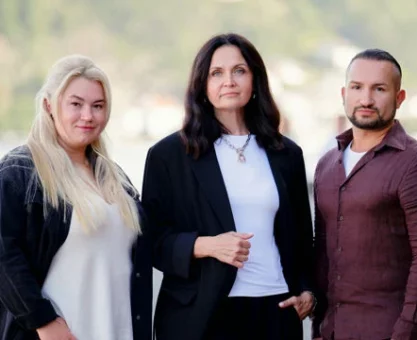Five days of intensive training where 35 participants from 18 media outlets immersed themselves in modern investigative journalism techniques, exchanged experience, and walked away with a toolkit of actionable ideas for future stories. This is a brief summary of the Investigative Bootcamp, held from July 8 to 12 in Lviv.
The event was organized and conducted by the Association «Independent Regional Press Publishers of Ukraine» (AIRPPU) as part of the Stronger Together: Transparency and Anti-Corruption program.

Conducting investigative reporting in regional media is a real challenge. In smaller towns, it’s harder to «dig» when everyone knows each other. Local newsrooms often lack both the experience and the resources to tackle complex topics. But this work goes far beyond exposure — it’s about deep responsibility to the community: showing how public funds are spent, who makes the decisions that affect people’s lives. And that matters — here and now — as the country endures a full-scale war.

The Investigative Bootcamp, held in Lviv as part of the «Stronger Together: Transparency and Anti-Corruption» program, aimed to bring together both experienced and aspiring investigative journalists, strengthen the knowledge and skills of regional reporters, teach them how to work with open data, identify potential story ideas, and develop hypotheses for investigations.The program combined intensive theory with hands-on practice, peer learning, and teamwork.
As the event took place during wartime, it was not without air raid alerts and another round of shelling. During these very days, the enemy launched the most massive attack on Lviv.

«Missile strikes on the city, coordinating people to shelters amid loud explosions, my own children in fear and without sleep… And yet, despite it all, we accomplished something truly important — we launched a critical project that will strengthen regional journalism over the next three years. The Investigative Bootcamp united 18 newsrooms», — said Oksana Brovko, CEO of the Association «Independent Regional Press Publishers of Ukraine» (AIRPPU).
A total of 35 participants from across the country — with varying levels of investigative experience — had the opportunity to work with real-life examples and cases presented by the speakers. They tested investigative tools in practice, analyzed asset declarations, procurement data, court cases, and business ties of public officials.
More practice and work
Each day, the program was designed to ensure that participants left the room with fresh ideas, a toolkit of knowledge, and a clear sense of direction for their next steps.

By the way, as we mentioned earlier, the event featured speakers who are true professionals — journalists with years of investigative experience behind them. The Investigative Bootcamp got off to a strong start thanks to Bihus.Info journalists Anastasiia Usenko and Nataliia Lazarovych. They shared insights on public interest, finding story ideas, and working with sources — as well as on legal risks and how investigative journalists can stay safe in their work.

A strong continuation of this thematic line was a training session by Bihus.Info editor Maksym Opanasenko. He demonstrated how to search for and identify individuals — essentially, an introduction to basic OSINT for journalists, including working with social media and an overview of useful investigative tools.

An important part of the program was the intensive session on working with the YouControl system, where YouControl analyst Mykhailo Koltsov shared expert recommendations.

Together with Nataliia Onyisko, co-founder of NGL.media, participants analyzed public officials’ asset declarations and looked for signs of illicit enrichment, as well as checked officials’ connections to businesses.

Oleksandra Hubytska, project manager at NGL.media, used practical examples to show that working with public procurement data — searching through BI Prozorro, E-data, and other tools — isn’t as intimidating as it might seem. That is, of course, if done regularly and systematically.
On the final, fifth day of the intensive, the focus was on court registers — both domestic and international — as well as criminal cases.

Alisa Yurchenko from «The Kyiv Independent» shared her experience and exclusive data sets with the participants.

No ideas left behind
«Our goal was to make this Bootcamp as practical, meaningful, and engaging as possible. We designed the program so that participants just beginning their investigative journalism journey could learn how to work with open databases and take their first confident steps. And for those with experience — to strengthen their skills, share their insights, and discover new tools to make their work even more effective», — said Oksana Brovko, CEO of the Association «Independent Regional Press Publishers of Ukraine» (AIRPPU).

Participants’ feedback shows that the intensive became a real catalyst for new investigations, deeper analytical work, and the development of newsroom capacity. Each team returned to their home city with a list of new topics and ideas.

For example, here are a few reflections from media professionals:
«I’ve been doing investigative reporting for 10 years. I’ve attended similar trainings before, but still got a fresh dose of ideas, tools, and inspiration here. I especially liked the session on identifying individuals by Maksym Opanasenko. I should mention — I’m not a trained journalist by education, but I became an investigative reporter thanks to events like this. I’m grateful to the organizers for bringing us together and giving us the push to move forward», — said Olesia Lantsman, journalist at «Intent».
«There’s a serious shortage of investigative centers in the regions right now. And above all — we always lack people. As soon as someone learns the skills, they often move on to national media, while the regions continue to face a talent deficit. This has been a persistent problem for years. Thanks to these five-day foundational trainings, covering everything from the basics to working with large datasets, we can grow a new generation of investigative journalists in regional media. A lot of great tools were presented — ones we can and should start using. And it’s also a great opportunity to hear from more experienced professionals and know who to turn to for advice», — added Valerii Bolhan, editor-in-chief at «Intent».
«I never thought lectures about public procurement could be so interesting and engaging. I’m very grateful to Oleksandra Hubytska, all the speakers, and the organizers for creating such a well-designed program, delivered in a great format with lots of practical tasks. Now I know where to look, what tools are available, how to work, and where to start. Since our media outlet is just beginning to move in this direction, all the knowledge and advice we received is incredibly valuable», — noted Yuliia Kotliar, Deputy Editor-in-Chief at «Odeske Zhyttia».
«Investigative journalism must be developed — especially during wartime, and especially in the regions. The schemes haven’t disappeared, and with the war, their number has only increased. Only journalists can expose them with real investigations, not just by publishing a news piece. These stories get attention. And that’s how we can change the situation, prevent overpayments, or stop contracts from being handed to ‘insiders’ without any actual work done. I’m grateful to the organizers and speakers — because investigative journalism, procurement, and registry work is a field where you can never know everything. New things appear constantly. And when someone more experienced shares their ideas, you realize what you haven’t done yet or what could be done in a simpler way. I hope we’ve all improved our skills», — said Myroslava Prymak, journalist at «Fourth Power».
«I discovered many useful tools for the first time in my life — and thanks to the Investigative Bootcamp, I’ll definitely return to them a second, third, and many more times. Thank you for designing a program that was interesting and thoughtful not only for those with experience but also for those just starting their investigative journey», — shared Tetiana Tsyrulnyk, editor-in-chief at «Kolo.News».
«I appreciated the attention to small things and details. Before, we might never have thought there was something worth digging into — but now we know what could be hidden behind seemingly insignificant numbers. It was interesting, insightful, and inspiring», — said Olha Mahazynska, journalist at «Odesa Life».
«A very cool and extremely helpful intensive. Everything just clicked into place — like books on a shelf. There were great algorithms and invaluable tips from professionals. I’m a philologist by education — and I’ll admit, I’m afraid of numbers. Budgets used to seem mystical and terrifying. But after this training, I now view them differently. I understand what to focus on, where to look for irregularities, and how to do it. Bootcamps like this are incredibly useful, and they definitely bring results. Because everything you hear, see, feel, and do here — you simply can’t forget. You’ll definitely want to come back. And I’m very glad we’re heading home with ideas. Together with my colleague, we’re already starting to ‘dig’ into one of the topics we brought to this event», — said Larysa Zharkykh, journalist at «Vhoru».
An Investment in the Future
The AIRPPU team carefully documented all key investigative techniques and insights to share them later with a wider audience. Our mission is to strengthen the capacity of regional newsrooms to fight corruption and cover critical issues without fear or bias. We’ll be sharing some of these practical cases on our pages and website very soon.

«We believe that supporting investigative journalism in the regions is an investment in a strong civil society. Our mission is not only to provide knowledge, but also to create a sustainable support environment where newsrooms can confidently tackle complex issues», — emphasized Oksana Brovko, CEO of the Association «Independent Regional Press Publishers of Ukraine» (AIRPPU).
The program Stronger Together: Media and Democracy is implemented by the World Association of News Publishers (WAN-IFRA) in partnership with the Association «Independent Regional Press Publishers of Ukraine» (AIRPPU) and the Norwegian Media Businesses’ Association (MBL) — with the support of Norway.





















